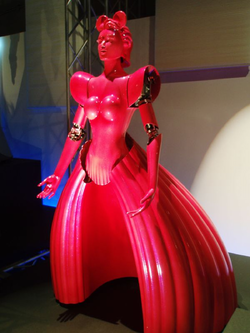Robot: Difference between revisions
m →Origin: typo |
m →Origin: tense |
||
| Line 5: | Line 5: | ||
==Origin== | ==Origin== | ||
The word was first introduced in the Czech play "R.U.R. (Rossum's Universal Robots)", published in 1920. Author Karel Čapek | The word was first introduced in the Czech play "R.U.R. (Rossum's Universal Robots)", published in 1920. Author Karel Čapek attributed the creation of the word "robot" to his brother Josef. The Czech word "robota" literally means "serf labor", and figuratively "drudgery" or "hard work", and also (more generally) "work", "labor" in many Slavic languages. | ||
==Examples in fiction== | ==Examples in fiction== | ||
Revision as of 19:22, 1 September 2013

A robot is an electromechanical device that performs work by itself or with direction based on its computer programming or microcircuitry. Colloquially, the term often refers to a machine in humanoid form. When it is used this way, it is used as a catch-all term that can include specific definitions like android, gynoid or fembot.
When the word "robot" is used to describe a human-like character in TV, movies or other fiction, it is usually understood that this character is an android.
Origin
The word was first introduced in the Czech play "R.U.R. (Rossum's Universal Robots)", published in 1920. Author Karel Čapek attributed the creation of the word "robot" to his brother Josef. The Czech word "robota" literally means "serf labor", and figuratively "drudgery" or "hard work", and also (more generally) "work", "labor" in many Slavic languages.






